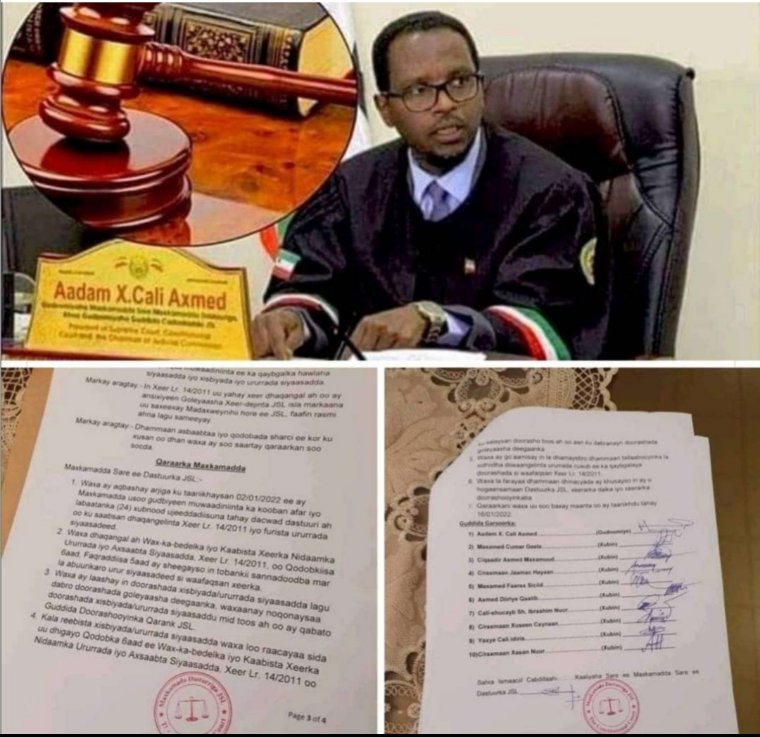

On Sunday 16th January, Somaliland’s Constitutional Court issued two rulings that have the potential to prevent a prolonged electoral deadlock in Somaliland.
The first decision pertained to a judicial review request from forty-six members of the parliament regarding whether amendments to the electoral law passed by the previous parliament was in effect. The MPs led by the deputy speaker of the House argued that the bill took effect although the President did not sign it into a law.
On Sunday 16th January, Somaliland’s Constitutional Court issued two rulings that have the potential to prevent a prolonged electoral deadlock in Somaliland.
The Court dismissed this request on procedural and legal grounds ordering that the request be removed from court record. The opposition parties scored their first victory as the decision firmly puts the debate on the electoral law back on the floor of the House where they command a majority. Abdirahman Irro, the presidential candidate of Waddani party, had previously warned the court of infringement on the powers of the parliament.
The second decision of the court was on the Constitutional case submitted by 24 politicians and activists regarding the opening of the registration of new political parties. The Court ruled that Law 14/2011 was in effect which calls for the opening of the registration of political associations of which three will be promoted to political parties every ten years.
It further called for the separation of the local council elections and the promotion of political associations to political parties. Instead it ruled a direct election for the qualification of political parties to be held by the National Elections Commission.
The two rulings were welcomed by all camps — the opposition, government and the independent politicnot be contingent on the local councils’ election which will not be held until 2026.
The opposition were content with the assertion that the amendments of Bill 14/2021 were not effective and instead Law 14/2011 was applicable. Khadar Hussein Abdi, the Secretary-General of Waddani Party, said the ruling removed the Bill 14/2021 which he claimed was designed to become an obstacle to timely conduct of the presidential election.
“The crux of the argument was that in 2021 the previous parliament introduced an amendment to the Electoral Law 14/2011. The objective of this amendment was to obstruct the conduct of the presidential election,” Khadar Hussein told reporters. He added “the reason we welcome this ruling is that the court removed this obstacle”.
On the other hand, the government claimed victory in that the National Electoral Commission would now decide on the timetable of elections as per their interpretation of the ruling.
Mohamed Kahin, the Minister of the Interior and Deputy Chairperson of Kulmiye party, said they are ready for a timely presidential election and defer to the authority of the electoral commission on setting the time-table.
The positive reception for the Court rulings from all sides seems to indicate a preemptive end for a controversy over the conduct of the elections scheduled for this year — the House of Elders’ and the presidential. However, much of mistrust between the president and the opposition remains. In the past few weeks, the opposition have repeatedly accused the president of orchestrating a political crisis to get himself a term extension. The President and his government have been doing little to assuage these concerns. Mohamed Kahin, the Minister of The Interior, came the closest to denying that charge saying they will comply with the NEC election time-table.
more recommended stories
 Somaliland Parliament: Any Consequences from PM’s Visit Are Somalia’s Responsibility
Somaliland Parliament: Any Consequences from PM’s Visit Are Somalia’s ResponsibilityHARGEISA, April 12, 2025 — The.
 From Berbera to Washington: Somaliland’s Strategic Pitch for U.S. Support
From Berbera to Washington: Somaliland’s Strategic Pitch for U.S. SupportIn a comprehensive interview with The.
 Somaliland to Defend Sovereignty Against Somalia’s Provocative Laascaanood Visit
Somaliland to Defend Sovereignty Against Somalia’s Provocative Laascaanood VisitThe Ministry of Foreign Affairs and.
 New Director Appointed: Burao Hospital’s Fall and the Fight for Revival
New Director Appointed: Burao Hospital’s Fall and the Fight for RevivalBurao Hospital begins a new chapter.

